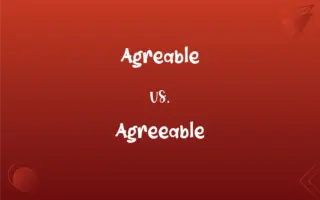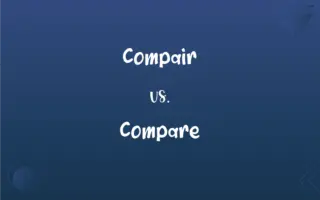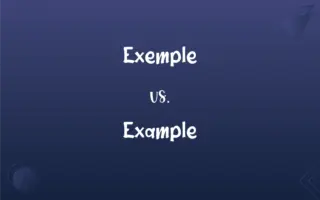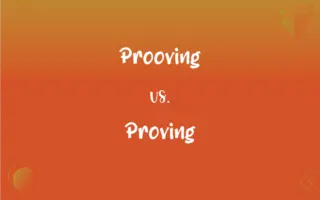Initative vs. Initiative: Mastering the Correct Spelling
Edited by Harlon Moss || By Janet White || Published on March 12, 2024
"Initative" is an incorrect spelling, the correct spelling is "initiative", referring to the ability to assess and initiate things independently.
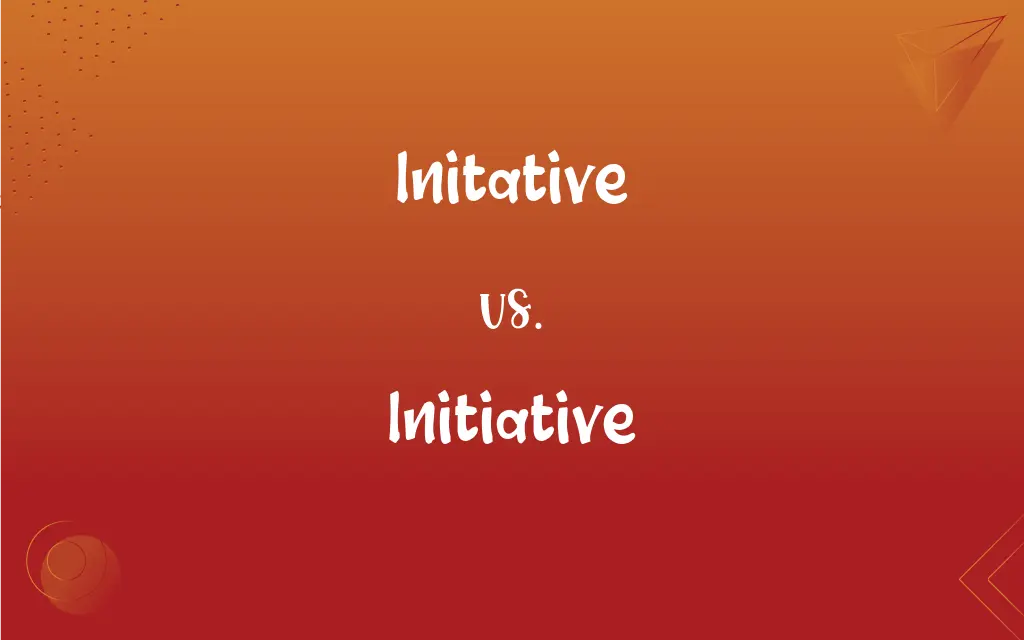
Which is correct: Initative or Initiative
How to spell Initiative?

Initative is Incorrect

Initiative is Correct
ADVERTISEMENT
Key Differences
Use a mnemonic: "Initiate with drive," combining "initiate" and "drive" to remember the "i" in the middle.
Remember that "initiative" includes "active," implying action or the start of something.
Break it down to "in-it-ia-tive," focusing on the "ia" rather than the incorrect "a" in "initative."
Associate "initiative" with "creative," both ending in "ive" and implying a quality or state.
Think of "initiate" as the base, adding "ive" to form "initiative," denoting the quality of initiating.
ADVERTISEMENT
Correct usage of Initiative
Taking the first initative can be daunting.
Taking the first initiative can be daunting.
He lacks the initative to improve his skills.
He lacks the initiative to improve his skills.
Initiative is essential for starting new projects.
Her strong initative was admired by her colleagues.
Her strong initiative was admired by her colleagues.
Without proper initative, ideas remain unexplored.
Without proper initiative, ideas remain unexplored.
Initiative Definitions
It can mean a plan or strategy intended to resolve a problem.
The new initiative aims to reduce waste.
Initiative refers to the ability to start or do something independently.
She took the initiative to organize the event.
In a political context, it's the right to introduce legislation.
The initiative was put to a public vote.
It can also mean a personal quality of being resourceful.
Her initiative impressed her employers.
Initiative suggests proactive effort or action.
His initiative saved the company time and money.
The power or ability to begin or to follow through energetically with a plan or task; enterprise and determination.
A beginning or introductory step; an opening move
Took the initiative in trying to solve the problem.
The power or right to introduce a new legislative measure.
Initiative Sentences
A good leader encourages initiative among team members.
Taking initiative can set you apart in your career.
His initiative led to the success of the project.
Students with initiative tend to excel in their studies.
The initiative to change the process improved efficiency.
Showing initiative often leads to new opportunities.
She took the initiative to solve the problem.
Her initiative in volunteering made a big impact.
The company's initiative focused on sustainable development.
He showed great initiative by learning new skills on his own.
Her initiative in starting a book club was well-received.
The initiative to reduce waste has been widely supported.
Personal initiative is key to achieving goals.
FAQs
Why is it called initiative?
It's called "initiative" because it denotes the act of initiating or beginning something, coming from the Latin "initium" for "beginning."
What is the root word of initiative?
The root word of "initiative" is "initiate," derived from the Latin "initium," meaning "beginning."
Which conjunction is used with initiative?
Conjunctions like "and" or "but" can be used with "initiative," depending on the context.
Which vowel is used before initiative?
The vowel "i" is used before "initiative."
What is the verb form of initiative?
Initiative does not have a verb form; "to initiate" is the related verb.
What is the pronunciation of initiative?
Initiative is pronounced as /ɪˈnɪʃətɪv/.
Which preposition is used with initiative?
Prepositions like "on," "for," and "with" are commonly used with "initiative," depending on the context.
Which article is used with initiative?
The indefinite article "an" or the definite article "the" can be used with "initiative."
Is initiative a noun or adjective?
Initiative is a noun.
Is initiative an abstract noun?
Yes, initiative is an abstract noun, referring to a concept or quality.
What is the plural form of initiative?
The plural form is "initiatives."
Is initiative an adverb?
No, initiative is not an adverb.
Is the word initiative imperative?
No, "initiative" is not imperative; it is a noun.
Is initiative a negative or positive word?
"Initiative" is generally considered a positive word, denoting proactivity and resourcefulness.
Is initiative a countable noun?
Yes, "initiative" is a countable noun.
What is a stressed syllable in initiative?
The stressed syllable in "initiative" is the second syllable: "ni."
What is the singular form of initiative?
The singular form is "initiative."
Which determiner is used with initiative?
Determiners like "the," "an," "this," or "that" can be used with "initiative."
What is the first form of initiative?
The first form is "initiative," as it is a noun and does not have verb forms.
What is the second form of initiative?
There is no second form; "initiative" remains unchanged as it is a noun.
What is the third form of initiative?
There is no third form; "initiative" remains unchanged as it is a noun.
Is the initiative term a metaphor?
"Initiative" can be used metaphorically to describe someone's proactive actions or efforts.
How do we divide initiative into syllables?
Initiative is divided into syllables as in-i-ti-a-tive.
What is another term for initiative?
Another term for "initiative" could be "enterprise" or "proactiveness."
How is initiative used in a sentence?
Initiative can be used in a sentence like "Taking initiative, he immediately began to organize a response team."
Is initiative a vowel or consonant?
The word "initiative" starts with the vowel "i."
Is initiative a collective noun?
No, "initiative" is not typically considered a collective noun.
How many syllables are in initiative?
"Initiative" has four syllables.
What part of speech is initiative?
"Initiative" is a noun.
What is the opposite of initiative?
The opposite of "initiative" could be "inaction" or "passivity."
About Author
Written by
Janet WhiteJanet White has been an esteemed writer and blogger for Difference Wiki. Holding a Master's degree in Science and Medical Journalism from the prestigious Boston University, she has consistently demonstrated her expertise and passion for her field. When she's not immersed in her work, Janet relishes her time exercising, delving into a good book, and cherishing moments with friends and family.
Edited by
Harlon MossHarlon is a seasoned quality moderator and accomplished content writer for Difference Wiki. An alumnus of the prestigious University of California, he earned his degree in Computer Science. Leveraging his academic background, Harlon brings a meticulous and informed perspective to his work, ensuring content accuracy and excellence.

